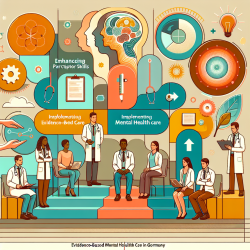The COVID-19 pandemic has significantly impacted mental health worldwide, particularly among adolescents. With school closures and social isolation, many young people have faced increased risks of depression. A recent study titled A Randomized Trial of Online Single Session Interventions for Adolescent Depression during COVID-19 provides valuable insights into effective strategies for addressing these challenges. This blog explores how practitioners can leverage the findings to enhance their skills and better support adolescents.
The Importance of Accessible Interventions
Before the pandemic, fewer than 50% of adolescents with depression accessed mental health services. The pandemic has further complicated access to care due to financial constraints and logistical barriers. This highlights the need for accessible interventions that can be delivered remotely and at low cost. The study examined the effectiveness of online single-session interventions (SSIs) in reducing depressive symptoms among adolescents.
Understanding Single-Session Interventions
SSIs are brief, focused interventions that incorporate elements of evidence-based treatments. The study tested two types of SSIs: a behavioral activation SSI and a growth mindset SSI. Both interventions were designed to be self-guided and completed online in under 30 minutes, making them highly accessible to adolescents across diverse settings.
- Behavioral Activation SSI (BA-SSI): This intervention encourages engagement in valued activities to improve mood and increase perceived agency.
- Growth Mindset SSI (GM-SSI): This intervention teaches that personal traits are malleable, aiming to reduce hopelessness and anxiety.
Key Findings from the Study
The study involved 2,452 adolescents aged 13-16 from across the United States. Participants were randomly assigned to one of three groups: BA-SSI, GM-SSI, or a supportive control. The results showed that both active SSIs led to significant reductions in depressive symptoms over three months compared to the control group.
- Depressive Symptoms: Both SSIs reduced depressive symptoms with effect sizes (d=0.18).
- Hopelessness and Agency: Both SSIs decreased hopelessness and increased perceived agency post-intervention.
- Anxiety and Trauma: The GM-SSI also reduced generalized anxiety and COVID-19-related trauma symptoms.
Implications for Practitioners
The findings underscore the potential of SSIs as scalable solutions for adolescent depression. Practitioners can integrate these interventions into their practice by:
- Offering SSIs as Initial Support: Use SSIs as a first step for adolescents showing early signs of depression.
- Diversifying Treatment Options: Incorporate SSIs alongside traditional therapies to enhance accessibility and flexibility.
- Tailoring Interventions: Match adolescents to specific SSIs based on their individual needs and symptoms.
The study demonstrates that even brief interventions can yield meaningful improvements in mental health outcomes. As practitioners continue to navigate the complexities of adolescent mental health during the pandemic, adopting innovative approaches like SSIs can make a significant difference.
A Randomized Trial of Online Single Session Interventions for Adolescent Depression during COVID-19










